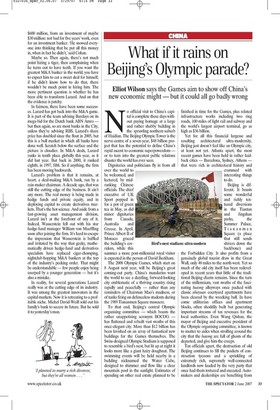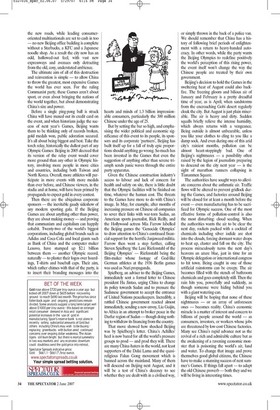What if it rains on Beijing's Olympic parade?
Elliot Wilson says the Games aim to show off China's new economic might — but it could all go badly wrong No official visit to China's capital is complete these days without paying homage at a large and rather shabby building in the sprawling northern suburb of Haidian. The Beijing Olympic Tower is the nerve-centre of a seven-year, $48 billion project that has the potential to define China's rapid ascent to economic superpowerdom — or to turn into the greatest public relations disaster the world has ever seen.
Dignitaries and politicians fly in from all over the world to - be welcomed, and lectured, by midranking Chinese officials. The chief executive of UK Sport popped in for a pot of green tea in May, as did minor dignitaries from Canada, Australia and Greece. In April, Prince Albert II of Monaco graced the building's corridors, while this summer a more post-millennial royal visitor is expected in the person of David Beckham.
The 2008 Olympic Games, which start on 8 August next year, will be Beijing's great coming-out party. China's mandarins want the world to see a dazzling, forward-looking city emblematic of a thriving country rising rapidly and peacefully — rather than any reminders of Chairman Mao's madness, or of tanks firing on defenceless students during the 1989 Tiananmen Square massacre.
To that end, Beijing's central Olympic organising committee — which boasts the rather unappetising acronym BOCOG — has flattened and rebuilt vast swaths of this once-elegant city. More than $12 billion has been lavished on an array of fantastical new buildings for the Games themselves. The Swiss-designed Olympic Stadium is supposed to resemble a bird's nest, but lit up at night it looks more like a giant hairy doughnut. The swimming events will be held nearby in a building nicknamed the Water Cube, designed to shimmer and flow like a clear mountain pool in the sunlight. Estimates of spending on other real estate planned to be finished in time for the Games, plus related infrastructure works including two ring roads, 100 miles of light rail and subway and the world's largest airport terminal, go as high as $36 billion.
Yet for all this financial largesse and resulting architectural ultra-modernity, Beijing just doesn't feel like an Olympic city, at least not yet. Atlanta apart, the most recent games have been held in rather laidback cities — Barcelona, Sydney, Athens — that were rich in architectural history and crammed with interesting things to do.
Beijing is different. It boasts some wonderful and richly textured diversions in the Tiantan and Jingshan parks, the Summer Palace, Tiananmen Square (a place that still sends shivers down the backbone) and the Forbidden City. It also profits from a genuinely global tourist draw in the Great Wall, only 40 miles to the north-west. Yet so much of the old city itself has been redeveloped in recent years that little of the traditional Beijing charm remains. Since the turn of the millennium, vast swaths of the fascinating hutong alleyways once packed with classic siheyuan courtyard apartments have been cleared by the wrecking ball. In have come utilitarian offices and apartment blocks, often shoddily built but generating important streams of tax revenues for the local authorities. Even Wang Qishan, the mayor of Beijing and executive president of the Olympic organising committee, is known to mutter to aides when strolling around the city that the hutong are full of ghosts of the departed, and give him the creeps.
Tax officials apart, the destruction of old Beijing continues to fill the pockets of construction tycoons and a sprinkling of extremely rich, supremely well-connected landlords now lauded by the very party that once had them tortured and executed. Automakers and dealerships are benefiting from the new roads, while leading consumeroriented multinationals are set to cash in too — no new Beijing office building is complete without a Starbucks, a KFC and a Japanese noodle shop. As a result the city now has an odd, hollowed-out feel, with vast new expressways and avenues only detracting from the old, cosy, understated ambience.
The ultimate aim of all of this destruction and reinvention is simple — to allow China to throw the greatest, most expensive Games the world has ever seen. For the ruling Communist party, these Games aren't about sport, or even about bringing the nations of the world together, but about demonstrating China's size and power.
Before a single ping-pong ball is struck China will have maxed out its credit card on the event, and when historians judge the success of next year's Games, Beijing wants them to be thinking only of records broken, gold medals won, public adoration secured. It's all about being biggest and best. Take the torch relay, historically the dullest part of any Olympic Games: Beijing in 2005 decreed that its version of the relay event would cover more ground than any other in Olympic history, involving more people in more cities and countries, including both Taiwan and North Korea. Overall, more athletes will participate in more events with more medals than ever before, and Chinese viewers, in the stadia and at home, will have been primed by propaganda to expect gold in every contest.
Then there are the ubiquitous corporate sponsors — the inevitable gaudy sideshow of any modern sporting gala. If the Beijing Games are about anything other than power, they are about making money — and proving that communism and capitalism can happily cohabit. Twenty-two of the world's biggest corporations, including global brands such as Adidas and Coca-Cola and local giants such as Bank of China and the computer maker Lenovo, have stumped up $2.1 billion between them — another Olympic record, naturally — to plaster their logos over hoardings, T-shirts and baseball caps. Their aim, which rather chimes with that of the party, is to insert their branding messages into the hearts and minds of 1.3 billion impressionable consumers, particularly the 300 million Chinese under the age of 25.
But by setting the bar so high, and emphasising the wider political and economic significance of this event to its people, its sponsors and its corporate 'partners', Beijing has built itself up for a fall of truly epic proportions should anything go wrong. So much has been invested in the Games that even the suggestion of anything other than serene triumph sends panic waves through the entire party apparatus.
Given the Chinese construction industry's access to labour and lack of concern for health and safety on site, there is little doubt that the Olympic facilities will be finished on time, whatever the human cost. The threats to the Games have more to do with China's image. In May, for example, after months of increasing pressure on Chinese oil companies to sever their links with war-torn Sudan, an American sports journalist, Rick Reilly, and the Hollywood actress Mia Farrow labelled the Beijing games the 'Genocide Olympics' to draw attention to China's continued financial support for the horrific Janjaweed militia. Farrow then went a step further, calling Steven Spielberg `the Leni Riefenstahl of the Beijing Olympics' — Riefenstahl being the film-maker whose footage of God-like German athletes at the 1936 Berlin games was used as Nazi propaganda.
Spielberg, an adviser to the Beijing Games, immediately sent a formal letter to Chinese president Hu Jintao, urging China to change its policy towards Sudan and to pressure the Sudanese government to accept the entrance of United Nations peacekeepers. Incredibly, a rattled Chinese government reacted almost immediately, sending a new envoy, Liu Guijin, to Africa in an attempt to broker peace in the Darfur region of Sudan — though doing nothing to withdraw its financing from the country.
That move showed how shocked Beijing was by Spielberg's letter. China's Achilles' heel is now bared for all the world's pressure groups to prod — and prod they will. There are many China-haters in the world, not least supporters of the Dalai Lama and the quasireligious Falun Gong movement which is banned across the mainland. Many of them will descend on Beijing next August, and it will be a test of China's decency to see whether they are dealt with in a civilised way, or simply thrown in the back of a police van. We should remember that China has a history of following brief periods of enlightenment with a return to heavy-handed autocracy. In other words, while the party wants the Beijing Olympics to redefine positively the world's perception of this rising power, the event itself won't change the way the Chinese people are treated by their own government.
Beijing's decision to hold the Games in the sweltering heat of August could also backfire. The freezing gloom and bilious air of January and February is a pretty dreadful time of year, as is April, when sandstorms from the encroaching Gobi desert regularly cloak the city. But August is just plain miserable. The air is heavy and dirty. Sudden squalls briefly relieve the intense humidity, which always returns with a vengeance. Being outside is almost unbearable, unless you like your clothes to cling to you like a damp sock. And even during one of this arid city's rainiest months, pollution can be almost heart-stoppingly bad. One of Beijing's nightmares — a possibility often raised by the legion of journalists preparing to descend on the city next year — is the sight of marathon runners collapsing in Tiananmen Square.
The authorities have sought ways to alleviate concerns about the asthmatic air. Traffic flows will be altered to prevent gridlock during the Games, and factories around Beijing will be closed for at least a month before the event — even manufacturing has to be sacrificed for Olympic success. One of the most effective forms of pollution-control is also the most disturbing: cloud seeding. When the authorities wants the air to be clear the next day, rockets packed with a cocktail of chemicals including silver iodide are shot into the clouds, forcing dormant water drops to heat up, cluster and fall on the city. The process miraculously turns the next day's heavens an azure blue, just in time for an Olympic delegation or international congress to hit town. Being caught in one of those artificial rainstorms can be creepy. The air becomes filled with the stench of bathroom chemicals and goes completely still. Then the rain hits you, powerfully and suddenly, as though someone were hiding behind you with a giant watering-can.
Beijing will be hoping that none of these nightmares — or an array of unforeseen ones — becomes reality. China's economic miracle is a matter of interest and concern to billions of people around the world — as consumers, investors, or workers whose jobs are threatened by low-cost Chinese factories. Many see China's rapid advance not as the revival of a rich and admirable culture but as the awakening of a ravening economic monster that is poisoning the world's air, land and water. To change that image and prove themselves good global citizens, the Chinese have to make a stunning success of next summer's Games. If things fall apart — to adapt the old Chinese proverb — both they and we will be living in interesting times.





















































 Previous page
Previous page